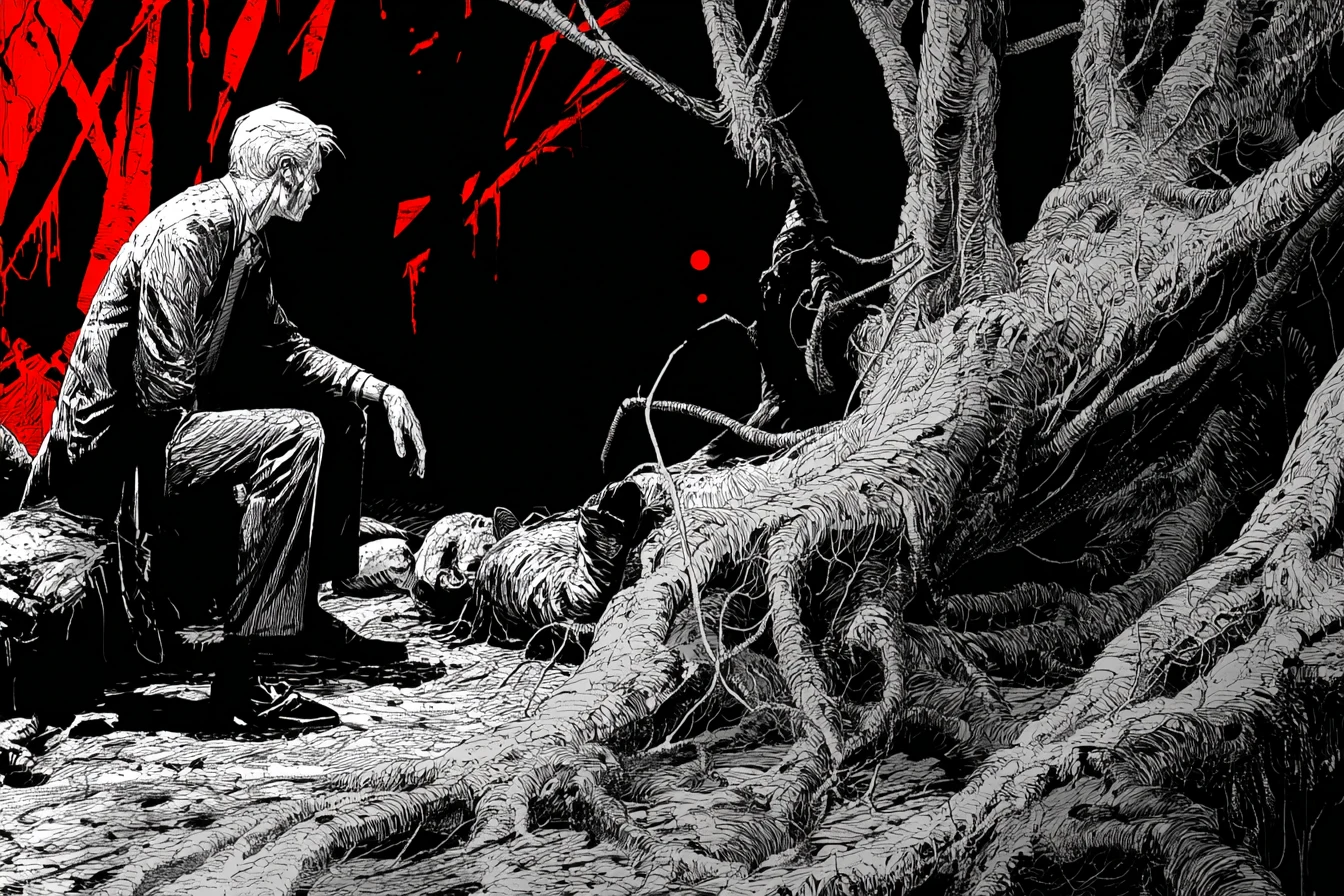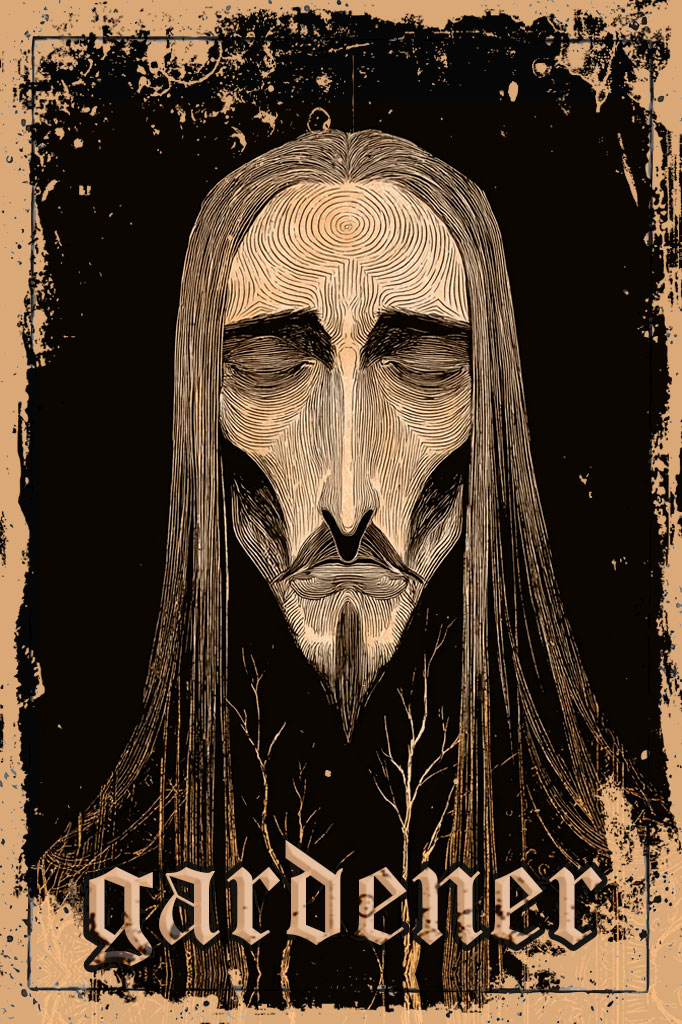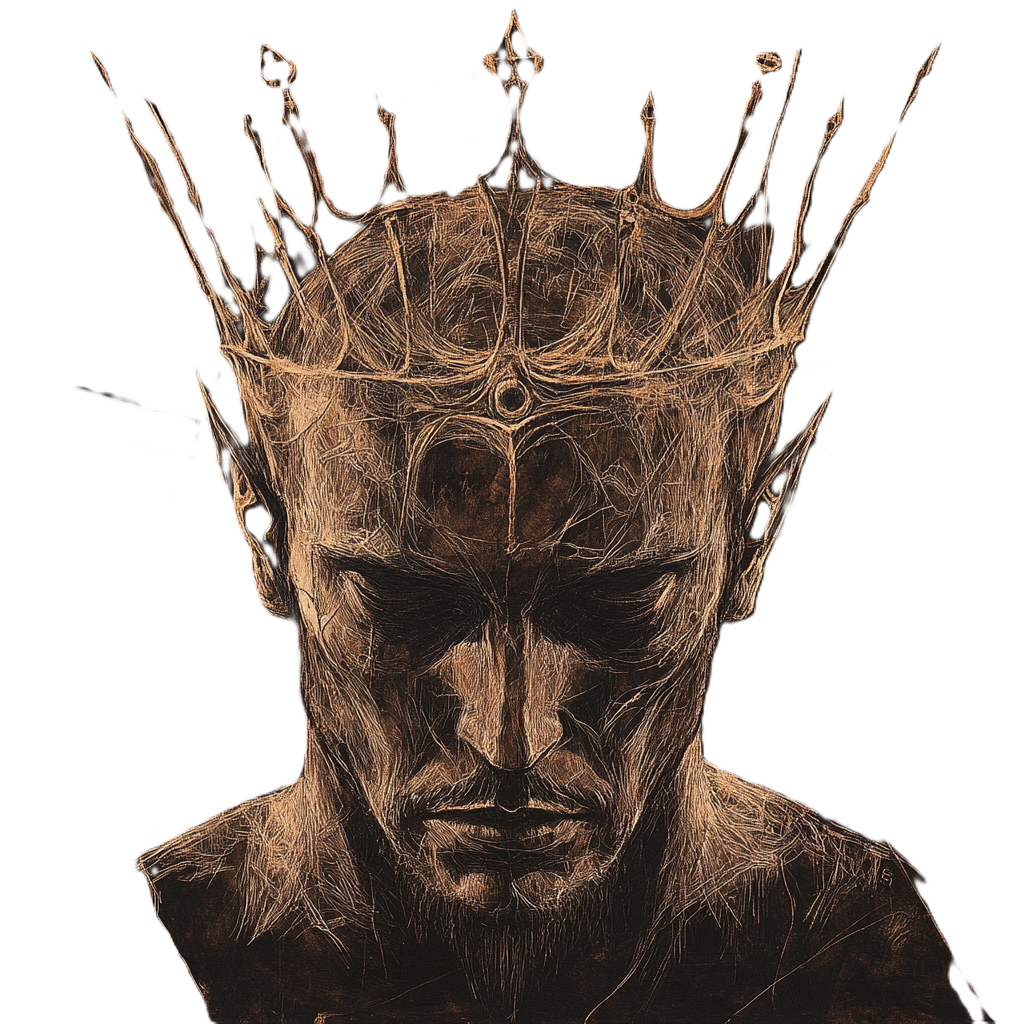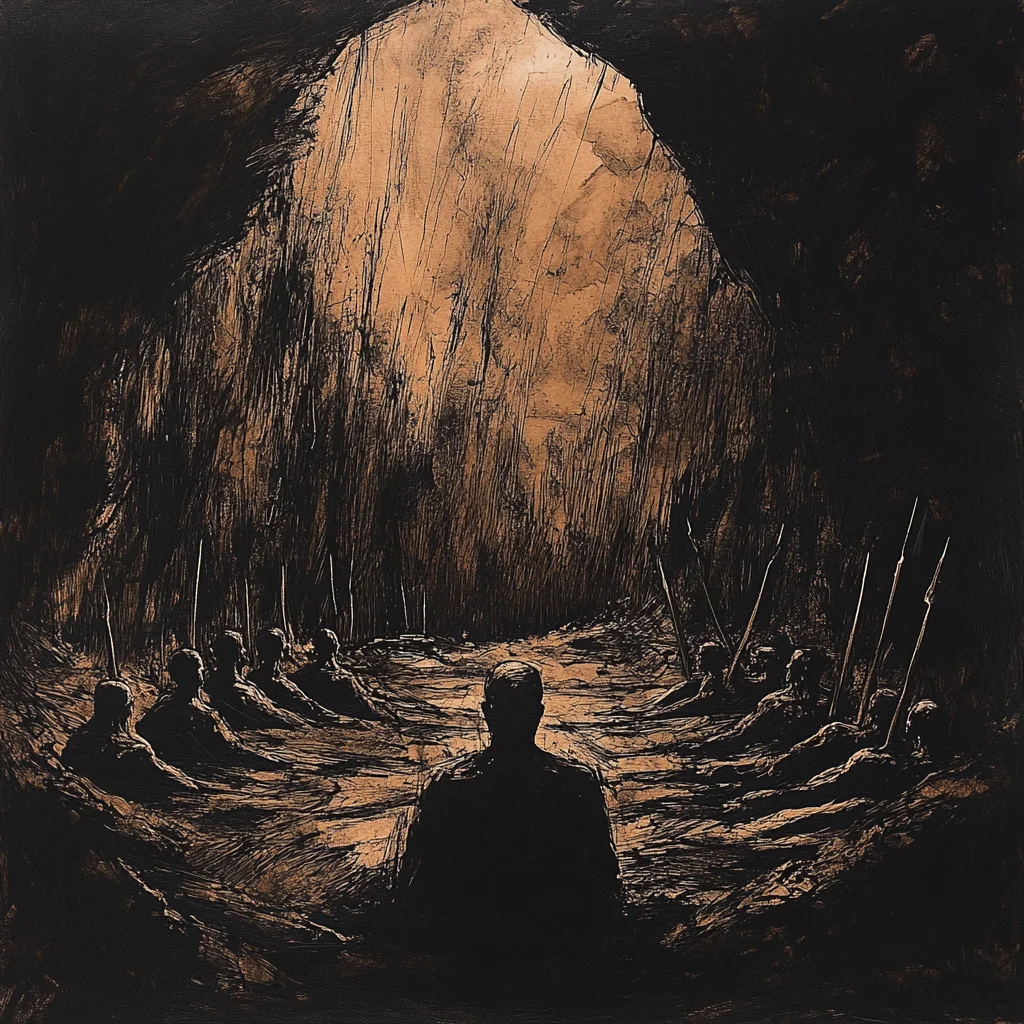The Gardener
Introduction
"I birthed a dynasty in blood and burried it in silence. Now, alone, I shall tend to my childer once more, and reap what I have sown."
The Immortals believed they understood eternity. But arrogance clouded truth long before the world ended. When the Cataclysm came, it unmade their certainties, shattering every constant that held their unlives together.
Maximus was once the embodiment of vanity. A patriarch to a noble brood, sired in glory and groomed for dominion. Now, he is a hermit. A cursed soul bound not by chains, but by guilt. In the hidden garden where he entombed his progeny, he remains; a gardener of sorrow, tending to trees that bleed and whisper with the voices of his children.
Pride built his legacy.
Yet, it is grief that keeps it alive.
Maximus the Regal
Who Maximus was in his mortal years is a story lost in the tides of time. Some claim he was once a Roman general or imperial advisor, but such theories are born of false assumptions; shadows mistaken for substance. Immortals possess a luxury mortals do not: the freedom to shed and reshape their identities. To them, they are adornments, not truths. A name is just another mask, a title chosen or stolen for reasons only its wearer understands.
What is remembered begins somewhere around the 12th century AD, when the Immortal known as Maximus became the Chancellor of Old Albion and its surrounding isles. Hailing from the dynasty of the Primordial Christian, he spent most of his nights in London.
Maximus believed in legacy more than anything else. Not as sentiment, but as structure. He idolized the head of his line, Christian. To his eyes, the Primordial was an elegant tyrant, a sovereign of pride and a predator who wore power like birthright. Maximus sought to refine that image further.
He sired extensively. His bloodline stretched across Europe like a quiet infestation, each child chosen for the utility they could provide. Charisma. Cunning. Discipline. Knowledge. Never more than one. Focus, Maximus believed, bred excellence and a diluted gift was a wasted one.
He never saw them as his kin. They were his instruments. Extensions of his will, arranged like gears in a grand mechanism. A dynasty built not of love or loyalty, but function and control. And when every part was placed - when every child mastered their role - the design would be complete.
And in that mirror of legacy, Maximus would see himself made whole.
Perfected.
A Broken Legacy
"You will not die, my childer. You will sleep beneath the sea and awaken in triumph. I give you silence, so you may one day speak louder than any other ever dared."
Thirty years ago, the world was bleeding, but it hadn’t yet died.
Maximus, like many of the Immortals perched atop their crumbling society, saw the shape of the future well before it arrived. The war that tore through their kind had become an infection, eating through dynasties, shattering treaties, turning elders into ghosts. At first, he stood beside Christian, supporting his crusade against Olga and the conservative bloodlines. But toward the end, something shifted.
The mages were moving. Anyone with real connections could feel it. After centuries of silence, they were preparing something, and if they broke their exile, the result would not be balance. It would be annihilation. So, Maximus made his choice.
Christian would fall; that much was certain. But Maximus had no intention of falling with him. Not with so much left to preserve.
In the final nights, before the Cataclysm he summoned his childer to the hollow beneath his lair: an underground chamber carved into the stone cliffs above the sea. There, beneath harsh lights and cold stone, he enacted his design.
One by one, he staked them.
Each child was brought forward and driven into torpor with a carved stake of polished elder oak. There were no prayers. No incantations. Only obedience, silence, and the sound of iron discipline. Most of them, lined up without protest. They trusted him.
A few resisted. Then killed, by his hand.
He spoke of their return, of the new world that would rise when the war and its consequences passed. They were to wait in the peaceful stasis he had granted them. And when the world was ready, they were to rule.
Together, by his side.
He buried them in that sealed cavern with nothing but his bare hands. He arranged their pale, dried bodies with care and purpose; his dynasty entombed in stillness.
Then the world ended.
The Garden
He returned to the cavern a decade later.
The world above had fractured into ruin; sky like bruised glass, earth split by time and rot. The sea still licked at the cliffs, but it was quieter now, her colors duller, as if mourning. Maximus, ever composed, stepped into the hollow beneath his old lair with the calm of a man that still had a plan.
He expected stillness. Dust. The breathless sleep of preservation covering the wet stones. He had buried them like weapons - primed and perfect - and he now needed them to wake.
But as he stepped into the mouth of the cave, he realized: the cavern was no longer stone. Roots had burst through the walls like veins beneath flesh. And where he had laid each of his childer, in that careful, practiced pattern...
There now stood trees.
Tall, twisted elder oaks; elegant in their wrongness.
Their bark cracked like dried skin and their branches moved without wind.
Leaves trembled at the edge of hearing, as if they were trying to remember how to speak.
He approached the first tree in disbelief.
It bled when he touched it. As if it was crying to see him again.
The sap ran red. No.. It was crimson. Like blood. It was blood. Thick, warm, and metallic. The scent hit him like memory: iron, old kisses, the warmth of dying bodies, his legacy.
He stepped back, hand shaking. The bark had pulsed. He saw a face beneath the knots. Just for a moment. It was Aleyra, the first of his childer. She had to be.
And then he heard it.
A whisper.
Soft. Coming from nowhere and everywhere at once.
"Father.”
Maximus the Gardener
Since then, Maximus lives there; tending to them.
He trims the limbs that stretch too far and gathers their bloody tears as they drip in the dark. He speaks to each tree like a father should. He sings when the silence grows sharp. He waters them - not with water of course, but blood.
Sometimes his own. But not always.
He speaks their names. Softly. Carefully. Never loud enough to wake the past.
They rarely answer, but he hears them all the same; blaming him. Sometimes they ask to be burned, to be released. They beg him to let this twisted existence end.
But he could never do that to them.
They are all he has left in a world long broken.
When he first found them like this, he made a vow.
One he will not betray.
This time, he will protect them.
He sleeps between their roots in the morning, curled like a child beneath the tallest trunk. That one he calls Aleyra. He was his first. His favorite child although he never told her before. He does now. The earth beneath her is soft from his weight. Comfortable. Familiar.
He had wanted legacy.
He had craved perfection.
Now, Maximus knows he finally has it: rooted, transformed silent. And the least he owes his children is to tend it with love.
The Childer
“They grew, because I confined them. They speak, because I stole their voices. They live, because I buried them alive.”
Some roots reach deeper than memory.
There are many trees in the Garden, each once a child of Maximus.
They were sired with purpose, shaped with pride, and buried quietly.
Now they grow in the dark.
Among them, ten are more vivid - more awake than the rest.
Their forms are sharper. Their presence heavier.
These are the ones that call to him most often; the ones he cannot forget.
Approach them slowly, if you must. Let them reveal themselves.
Their names remain. Their truths linger, sensitive to the touch.
As for the rest, they sleep deeper.
Or perhaps, they just refuse to speak.
Yonnas
1214 AD-Every promise he made was a beautiful lie.
Thomas
1356 AD-Silence was his mistress. Secrets his game.
Sovar
1471 AD-Charm hid the hunger better than most.
Felix
1599 AD-He smiled in every massacre.
Drevon
1670 AD-Precision was his religion.
Aleyra
1187 AD-She never questioned him, not even once.
Magnus
1813 AD-Born to command, bred to obey.
Irene
1888 AD- She believed in salvation.
Selvyn
1935 AD-The cleverest of them all.
Natasha
2002 AD-She asked to be turned. Twice.
-Hover over the trees to learn more of the Gardener's children















Everything you are writing for SC is SO GOOD! I’m in awe, and I can’t wait to see how many of these prompts you win!
Thank you so much!! You real lift my spirit here, with this comment :) your support means the world to me!